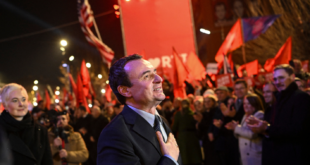More than one year after the European Parliament adopted a resolution condemning the genocide committed in Srebrenica in 1995 and called on all European countries to do the same, it is still not clear if politicians in Serbia will follow suit. Discussion starts on the resolution today.
The Collegium will discuss the text of the resolution today, which will then be passed to the full parliament where it will likely be addressed by the end of March.
Some politicians in Serbia are fiercely opposed to any resolution on Srebenica, and others have different views on what to call the crime that was committed in July 1995 in the eastern Bosnian town.
Certain politicans have expressed hope that two resolutions will be adopted: one that condemns the crimes committed in Srebrenica and a second that addresses crimes committed against Serbs during the wars in the 1990s.
Some, like the Liberal Democratic Party, LDS, support a strongly worded resolution that includes the term genocide.
The killing of more than 8,000 boys and man, and the expulsion of more than 25,000 civilians from Srebrenica in July 1995 is characterised as an act of genocide in the judgment made by International Court of Justice in The Hague in February 2007 in the case of Bosnia vs. Serbia.
Several members of the European Parliament, including Slovenian Jelko Kacin, German Doris Pack, and Austrian Hannes Swoboda, proposed in January 2009 a resolution condemning the genocide, which was then adopted with 556 votes in favour, 9 against and 22 abstentions.
The Parliament called all European Union members and Western Balkan countries to recognize July 11, the date of the start of the Srebrenica massacre, as “a day of commemoration throughout the EU”.
The resolution has been adopted by all but two of the Yugoslav successor states, and all of the countries have used the word genocide in their text.
The only state in the region that does not even have a draft of the resolution is Bosnia and Herzegovina, where Serb politicians from Republika Srpska, the predominantly Serb region, have refused to draft or adopt such a resolution. The president and prime minister of Republika Srpska have also expressed their opposition to Serbia’s movement to adopt a resolution
July 11 is a day of commemoration in only one half of the country, the Croat-Bosniak (Bosnian Muslim) federation. Every July 11 since 2004, families of victims of the genocide in Srebrenica have buried remains of those who were killed which have been found in the preceding year. More than 3,200 remains, in some cases just parts of bones, have been found, identified and buried in the Potocari memorial site.
In January this year, Serbian President Boris Tadic launched an initiative for a resolution to condemn the crimes committed in Srebrenica. Tadic did not use the term genocide in his public statements, and he has also expressed his support for the adoption of two resolutions.
The resolution on Srebrenica that was adopted by the EP also calls “for further efforts to bring the remaining fugitives to justice”. This includes General Ratko Mladic, who lead the Bosnian Serb forces to Srebrenica and who is believed to be hiding in Serbia.
Croatia’s parliament adopted a resolution in July 2009 after it was proposed by Semso Tucakovic, a Bosniak representative. In 2005 the Croatian parliament adopted a Statement on Srebrenica, which also condemned the crimes.
Macedonia`s parliament adopted the resolution in February this year.
“The sole purpose of the declaration is to condemn this war crime and genocide and to send a message that here in the Balkans we should bury nationalism and the idea of ethnic cleansing,” Silvana Boneva, a legislator from the ruling VMRO-DPMNE party, told media after the adoption of the resolution.
The resolution was supported by all parties except the Democratic Serb Party of Macedonia, which demanded a resolution that condemned all the crimes committed during the wars in the 1990s.
On July 9, 2009, the Montenegro Parliament adopted the resolution without the support of two parties, the Socialist National Party and the NOVA party, both of which objected on the grounds that the resolution “favored only one nation as a victim”. The resolution was proposed by Social Democratic Party MP Rifat Rastoder.
 Eurasia Press & News
Eurasia Press & News



